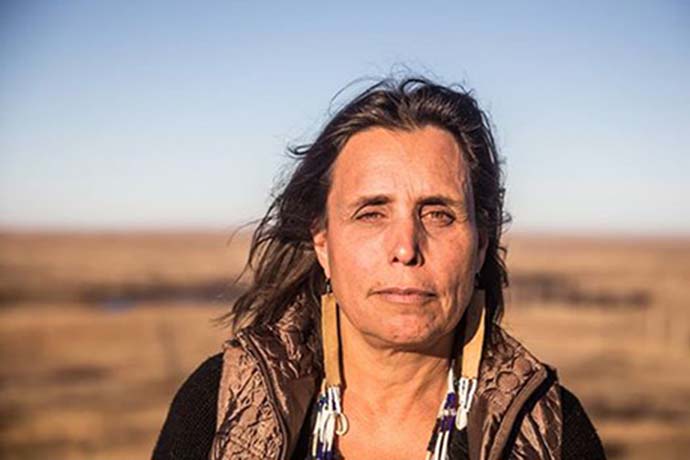Hess Scholar in Residence Winona LaDuke Says We Must Take the "Green Path" to Restore Our Environment and Economy
Oct. 9, 2020
Looking to indigenous people for guidance is a good start, said the First Nation activist.

Activist, environmentalist, rural development economist, and 2020 Hess Scholar in Residence Winona LaDuke at Standing Rock Reservation in the Dakotas.
"I'm speaking to you from Round Lake, which is the headwaters of the Red River that flows to Hudson Bay. . . I'm in the heart of the Great Lakes territory, the Anishinaabe territory," said Winona LaDuke, First Nation activist and keynote speaker at the 2020 Hess Scholar in Residence memorial lecture. LaDuke's talk, titled "Lighting the 8th Fire, Economics for the 7th Generation," concluded a week of virtual events that included panel discussions and conversations on decolonization in the classroom, social justice, and sustainability, among other topics.
"In our Anishinaabe prophecies, we are told during the time of the seventh fire we will have a choice between two paths. One is well-worn, but it is scorched, and the other is not well-worn, and it is green. It is our choice upon which path to embark."
The 2020 Robert L. Hess Memorial Lecture, Lighting the 8th Fire, Economics for the 7th Generation, by Hess Scholar in Residence Winona LaDuke
LaDuke is the first indigenous scholar to receive the residency. "This event, and this entire week, which is inspired by student activism, is in line with Brooklyn College's mission to provide a transformative and distinctive education to all people of New York City," said Rosamond S. King, director of the Ethyle R. Wolfe Institute for the Humanities, which hosted the program. "It is part of a process to become more thoughtful and more respectful, and to more deeply incorporate indigenous and Native American cultures, philosophies, and peoples into the curriculum, faculty, student body, and staff of Brooklyn College."
LaDuke's work "is critical to our world, our nation, and our campus," said Provost and Senior Vice President for Academic Affairs Anne Lopes. "She addresses environmental, economic, and racial justice issues through the lens of indigenous studies and deep advocacy."
LaDuke, who lives and works on the White Earth Reservation in northern Minnesota, explained during the Zoom event that the price tag for taking from the land and not giving back, and not being reverent of the earth and its creatures, is the havoc that is being wreaked today—citing the effects of extreme weather and the destruction of massive amounts of America's western woodlands and ecosystems by wildfires.
LaDuke believes that the next economy must arise from what she calls "The Sitting Bull Plan/8th Fire," which includes a return to biodiversity ("Where there are indigenous people there is still biodiversity. Eighty percent of the world's biodiversity is in the territories of indigenous peoples.") She also stated that America must localize its agriculture and find innovative ways to grow food in urban areas, replace its aging energy infrastructure with more energy-efficient modes of transportation (e.g., electrify the rail system and power it from wind energy sourced from tribal lands), and shake off historical and ecological amnesia to care for and defend our environment. By doing this, we can go forward on the green path.
"America was great when there were 8,000 varieties of corn and when you could drink the water from every stream and river," said LaDuke. "Where I live is still the place where the wild things are. Wild rice is one of our most sacred foods. For 200 years, our people have fought to protect our rice from encroachment, from dam and pipeline projects. I know we can make change, and believe that we can put our good hearts and minds together to transform."
In cooperation with the Ethyle R. Wolfe Institute for the Humanities, the Robert L. Hess Memorial Lecture, supported by the Robert L. Hess Fund, was part of the 2019–2020 Scholar-in-Residence Program named for and in honor of the eighth president of Brooklyn College, whose commitment to scholarship and "the educated individual—knowledgeable, thoughtful, inquiring, alive to the shared purposes and concerns lining all intellectual pursuits," marked his tenure.






